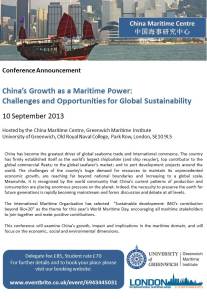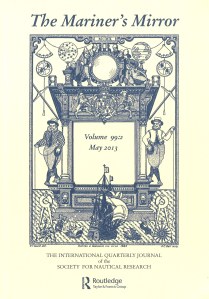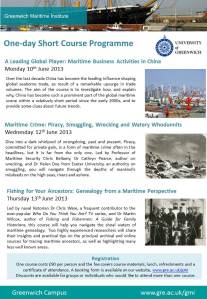In the early part of the 21st Century, the global community has gained enormous advantages from the expansion of China’s trade and maritime activities. Numerous countries have greatly benefited from China’s much closer integration into the world economy and maritime scene. Yet the huge demand for foreign resources, to assist China in maintaining its robust economic growth, has focused attention upon sustainability aspects, specifically the challenges and opportunities.
Many questions arise in a sustainability context. How are China’s shipping and trade evolving, and what is the impact? What are the social and human implications for China as a major supplier of maritime labour to the world market? How are environmental issues being handled in China, for instance those involving marine protected areas, ship recycling and maritime pollution? These elements have global as well as national impacts and ramifications.
A forthcoming Greenwich Maritime Institute (University of Greenwich) conference arranged by the GMI’s China Maritime Centre, on 10th September 2013 within the London International Shipping Week, will examine a wide range of topics. The conference is entitled ‘China’s Growth as a Maritime Power: Challenges and Opportunities for Global Sustainability’. Speakers from industry and academia have been invited to present their ideas. A prominent feature is new knowledge gained from cutting-edge academic research projects on China’s maritime issues, making the conference particularly informative. Discussion and debate will follow.
The Greenwich conference framework for China topics is maritime business and economics, social and human issues, and environmental aspects. The title echoes the theme adopted by the International Maritime Organization for World Maritime Day 2013. A theme of ‘Sustainable Development: IMO’s contribution beyond Rio+20’ was adopted for that occasion. In his speech to launch the theme, the IMO secretary-general clarified a crucial point. What does sustainable development actually mean? Reference was made to an earlier UN report where a clear definition was given: “development that meets the needs of the present without compromising the ability of future generations to meet their own needs.”
This event at Greenwich takes place, arguably, at a significant juncture. The Chinese economy appears to have reached a transitional period, between near or actual double-digit GDP growth rates until relatively recently, and a ‘more sustainable’ era of rather less rapid but still vigorous expansion. Maritime activities and their sustainability will be affected by the changing pace.
China’s role as a major player and, in some maritime activities, the largest and dominant player inevitably places its global involvement and implications under a spotlight. A few achievements are particularly noteworthy. China has become the leading influence shaping world seaborne trade and is by far the largest importer of dry bulk commodities. The merchant ship fleet controlled by Chinese companies is now one of the biggest. As well as being the largest shipbuilding country (by deadweight volume and contract value), China is a major ship recycler. It is also a prominent supplier of maritime labour to the global market. Much or most of these gains have been made within the past decade, a relatively short period for such a performance. The combined impact is hard to exaggerate.
As a result of this large-scale activity, steps which China is taking to tackle sustainability issues are viewed with great interest by the international community. On many maritime and related issues, it is noticeable that significant advances to correct any deficiencies are being made, and signs of likely further progress over the years ahead are visible.
Richard Scott
GMI visiting lecturer and MD, Bulk Shipping Analysis





